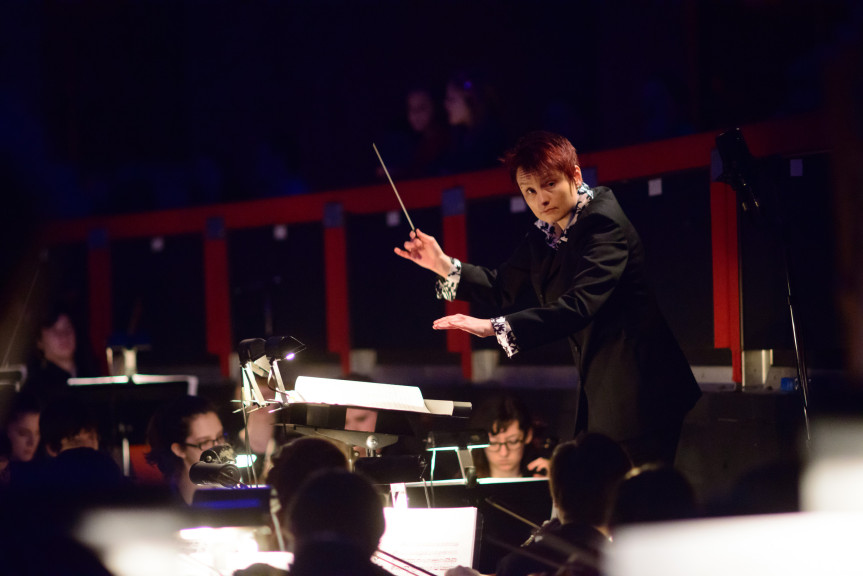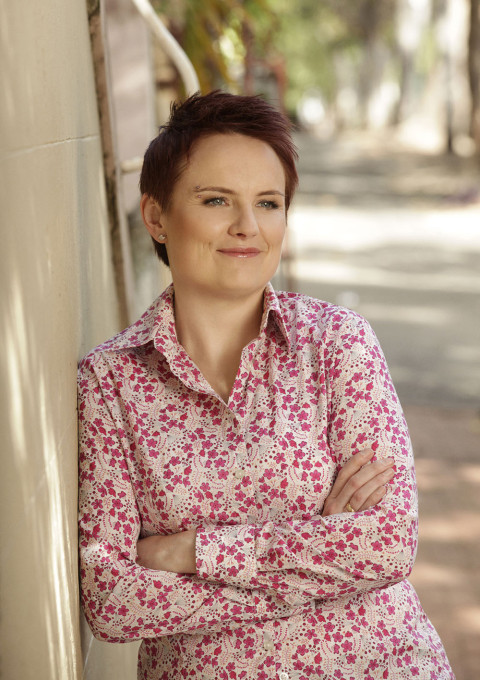UI Symphony Orchestra Concert Preview with Dr. Carolyn Watson

Dr. Carolyn Watson, Director of Orchestras at the University of Illinois
We sat down with Dr. Carolyn Watson, Music Director and Conductor of the University of Illinois Symphony Orchestra, in advance of the ensemble’s World/Folk Music concert on March 23. Dr. Watson is a relatively new addition to the faculty of the School of Music, having been appointed Director of Orchestras at the University of Illinois in August 2022. Read on to learn a bit more about Dr. Watson and the UISO's upcoming program.
As Director of Orchestras, Dr. Watson has a big job. She oversees the School of Music’s three orchestras: the Philharmonia Orchestra, Illini Strings, and Symphony Orchestra. She also runs the graduate orchestral conducting program for master's students and doctoral candidates. This means leading conducting seminars, giving conducting lessons, and teaching courses in graduate orchestral literature.
Originally from Australia, Watson has been based in the United States since 2013. When asked what drew her to the University of Illinois, she pointed to the scope and depth of the program at Illinois. “It is a school with a very long and respected history—the School of Music and the orchestral program, and graduate orchestral conducting, in particular,” she said. “So the opportunity to lead that program and potentially shape and influence the future of conducting training in the US is very exciting.”
Teaching is in Watson's blood, as both her parents are teachers. “I think there’s maybe some kind of genetic disposition there,” she joked. Teaching has been a part of her career from the outset, even before she began conducting professionally in her mid-thirties, having pivoted from a career as a violinist. Watson's position at the University of Illinois, therefore, combines her two main loves—conducting and teaching—and allows her to help shape the next generation of orchestral musicians. Outside her position at Illinois, she enjoys an ongoing association with Interlochen Center for the Arts, where she is on the conducting faculty for Interlochen Arts Camp, Interlochen College of Creative Arts, and Interlochen Online.
In addition to teaching, Watson maintains an active conducting career, serving as Principal Guest Conductor of the Kansas City Chamber Orchestra and Music Director of the La Porte County Symphony Orchestra in Indiana. She also maintains an active freelance career with ensembles in the US and abroad. For instance, in April, she will lead the Cape Symphony (Cape Cod, MA) in a program of Australian music. She also returns to Lyric Opera of Kansas City, where she is a frequent guest artist, for Listen, Wilhelmina!, an interactive children’s opera by David Hanlon. Then in May, she will conduct a concert with the Columbus Indiana Philharmonic, where she is a finalist for the position of Music Director.

When asked how she does it all, Watson said the key is organization and planning well in advance to make everything work together. “For example, when I do programming for the orchestra of which I’m the music director in Indiana," she explained, “I look also at what I’ve got coming up freelance-wise, and what the university is doing, and I try to be very strategic about where and when I’m doing any bigger works, any newer works—anything that I’ve not done before, basically—so that I do have time to eat and sleep. I try to be very mindful and very strategic in that regard.” It’s a delicate balancing act Watson likened to being a waiter with six plates in each hand. “I think that’s the thing for a lot of freelancers,” she continued. “Well, a lot of musicians in general, actually, but conductors, especially. It doesn’t rain; it pours. You’re home for three months, just hanging out, and then you’ll have three weeks of back-to-back engagements.”
Being this busy is worth it for Watson, who said that her performing career is an asset to her students at Illinois. “I have a very tangible and active connection to the profession,” she noted. “And the kinds of roles that I have had and the kinds of gigs that I do are many and varied. I do opera, I do ballet, I work with chamber orchestras, I work with very high-level professional orchestras. I also work with some smaller and regional ensembles. And I think that allows me to then be very helpful with respect to sharing with my students the range of possibilities that are out there and how they need to respond differently to the different kinds of contexts.”
Whether she's working with undergraduate musicans or seasoned professionals, Watson says the role of a conductor is ultimately the same. “You’re a coordinator, you’re a collaborator, you’re a facilitator,” she said. “It’s a position of great responsibility, and I guess I like bringing people together in that way…showing people all of the parts and how they fit together and what to listen for.”
The UISO’s concert on March 23 will present works that celebrate the folk music of indigenous peoples from around the world. The heart of the program will be Peter Sculthorpe’s Kakadu. Kakadu is one of Australia's largest national parks. Located in the Northern Territory, it has gained international fame as the setting of Crocodile Dundee. The piece, which is based on an Aboriginal chant, will feature one of the world’s foremost digeridoo virtuosos, William Barton. Though Kakadu originally did not include a part for digeridoo, Barton has recorded many different versions of the piece to include didgeridoo accompaniment. Living in Central Illinois, your opportunities to hear digeridoo music—let alone one of the world’s greatest didgeridoo players—are probably pretty limited, so this is an experience you won’t want to miss.
Also on this whistlestop tour of the world is Valerie Coleman’s Umoja, which takes its title from the Swahili word for “unity.” Though Coleman originally wrote Umoja as a piece for women’s chorus, she has since scored it for numerous instrumental configurations, including this version for full orchestra in 2019. The program will also include Carlos Chávez’s Symphony No. 2 “Sinfonía India,” which is based on Mexican folk tunes; Gabriela Lena Frank’s Three Latin American Dances, which takes inspiration from the composer’s Peruvian roots; and Huang Ruo’s Folk Songs for Orchestra, which is based on a selection of the composer’s favorite Chinese folk songs.
Though audience members may not know any of the pieces or even be familiar with any of the composers on the concert, Watson assures, "the audience is really going to love the program." In her inaugural season as Music Director of the UISO, Watson has selected repertoire that runs the gamut from traditional symphonic repertoire by the likes of Rimsky-Korsakov, Shostakovich, and Elgar to the works of lesser-known or contemporary composers. When asked how she approaches programming for the UISO, Watson responded that her primary consideration, first and foremost, is “it needs to be good music."
In addition to reinvigorating the standard repertoire, Watson hopes that by programming diverse music, she can best prepare her students for the varied challenges of a twenty-first-century music career. “Over the course of a year, and two years, and four years,” she continued, “I want to ideally show students the range of orchestral repertoire that is out there and equip them with the skills to navigate all that’s out there. And of course, it’s impossible for any orchestral program to do absolutely every piece of music that [students] are going to need. But I hope to share with them a range of orchestral experiences, genres, styles, stylistic knowledge, techniques, and all of those things that are going to allow them to know how to navigate the music that they will encounter.”
Besides introducing her students to a wide range of musical styles, she has this practical advice for aspiring conductors: “You have to start working very, very hard, very young. And you have to develop all aspects of your craft, starting with your musicianship, because I feel without that as a solid basis, it’s very, very challenging. You also have to be very proactive with regard to creating your own opportunities. The conducting profession is notoriously challenging. And it really takes a lot of persistence and dedication and hard work—and luck as well. Just because you work hard, it doesn’t necessarily guarantee success.”
One piece of advice she received as a student that has stuck with her came from her conducting professor at the University of Sydney, Imré Pallo. He said that conductors should approach score reading like reading a book. Instead of overanalyzing everything on the page with all the techniques you learn in music school, she said, “You just sit down and inquire…And it’s so obvious, but it’s there.” She also cited advice from conductor David Zinman, with whom she worked at the Aspen Music Festival. At the end of the summer, Zinman listed three key takeaways: “The first one was ‘Don’t talk.’ The second one was ‘Know the score.’ The third one was ‘Don’t talk.’” Perhaps there’s a lesson in that for us all—conductor or not.
Don’t miss the University of Illinois Symphony Orchestra’s World/Folk Music concert on Thursday, March 23, at 7:30 p.m. in Foellinger Great Hall at the Krannert Center for the Performing Arts. Click here for more information and to purchase tickets.



